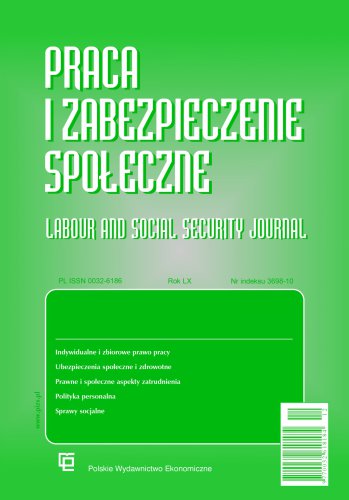Work-life balance and coronacrisis. A few notes about processes and their consequences
This article addresses issues that emerged with the COVID-19 pandemic. The issues of care by persons performing work have revealed their importance for the functioning of the market, although they remain invisible and largely underestimated as important for the functioning of the market and, above all, society. The author does not answer the question what to do next after the pandemic, but indicates the sphere of care as the approach to which requires a fundamental revision. Anyway, and to other issues that seemed to be the most important so far.
References
Bibliografia?Reference
Adamczyk, S. i Surdykowska, B. (2020). Świat pracy na bezdrożach. Refleksje wokół możliwych skutków pandemii COVID-19. Praca i Zabezpieczenie Społeczne, (4), 3–10.
Babińska-Górecka, R. (2015). Ewolucja treści ryzyka socjalnego osób „zatrudnionych” na podstawie umów cywilnoprawnych w ubezpieczeniu społecznym. W: M. Szabłowska-Juckiewicz, M. Wałachowska i J. Wantoch-Rekowski, Umowy cywilnoprawne w ubezpieczeniach społecznych. Warszawa.
Beauregard, T. A. i Henry, L. C. (2009). Making the link between work-life balance practices and organizational performance. Human Resource Management Review, 19(1), 9–22. https://doi.org/10.1016/j.hrmr.2008.09.001
Bauman, Z. (2000). Ponowoczesność jako źródło cierpień. Warszawa: Wydawnictwo Sic!
Boruta, I. (2005). W sprawie przyszłości prawa pracy. Praca i Zabezpieczenie Społeczne, (4), 2–12.
Boruta, I. (2020). O przyszłości pracy. Praca i Zabezpieczenie Społeczne, (1), 3–10.
Busby, N. (2011). A right to care?: Unpaid work in European Employment Law. Oxford University Press. https://doi.org/10.1093/acprof:oso/9780199579020.003.0001
Chang, A., McDonald, P. i Burton, P. (2010). Methodological choices in work-life balance research 1987 to 2006: A critical review. The International Journal of Human Resource Management, 21(13), 2381–2413. https://doi.org/10.1080/09585192.2010.516592
Crompton, R. i Lyonette, C. (2006). Work-life „balance” in Europe. Acta Sociologica, 49(4), 379–393. https://doi.org/10.1177/0001699306071680
Godlewska-Bujok, B. (2008). Ryzyko wykluczenia i niepewność. Praca i Zabezpieczenie Społeczne, (8), 2–7.
Godlewska-Bujok, B. (2015). Skuteczność prawa zatrudnienia w Polsce. Warszawa: Wydawnictwo Sejmowe.
Godlewska-Bujok, B. (2019). Work-life balance czy work-life conflict w kontekście prywatności pracowników sprawujących opiekę. W: B. Godlewska-Bujok i K. Walczak (red.), Różnorodność w jedności: studia z zakresu prawa pracy, zabezpieczenia społecznego i polityki społecznej. Księga pamiątkowa dedykowana profesorowi Wojciechowi Muszalskiemu. Warszawa: CH Beck.
Golinowska, S. (2011). O spójności i kapitale społecznym oraz europejskiej i polskiej polityce spójności. Polityka Społeczna, 38(5–6 (446–447)), 13–21.
GUS. (2018). Kobiety i mężczyźni na rynku pracy 2018. https://stat.gov.pl/files/gfx/portalinformacyjny/pl/defaultaktualnosci/5821/1/7/1/kobiety_i_mezczyzni_na_rynku_pracy_2018.pdf (01.05.2020).
GUS. (2019). Wybrane zagadnienia rynku pracy (liczba osób z minimalnym wynagrodzeniem, „samozatrudnieni”, umowy zlecenia, umowy o dzieło). Dane dla 2018 r. https://stat.gov.pl/obszary-tematyczne/rynek-pracy/pracujacy-zatrudnieni-wynagrodzenia-koszty-pracy/wybrane-zagadnienia-rynkupracy-dane-dla-2018-roku,9,7. tml, (01.05.2020).
Jang, S. J. (2009). The relationships of flexible work schedules, workplace support, supervisory support, work-life balance, and the well-being of working parents. Journal of Social Service Research, 35(2), 93–104. https://doi.org/10.1080/01488370802678561
Marczak, R. (2016). Obowiązek ubezpieczenia społecznego. Ubezpieczenia Społeczne. Teoria i Praktyka, (3), 157–188.
MOP. (2020). Family-friendly policies and other good workplace practices in the context of Covid-19: Key steps employers can take, IN=nterim recommendations,27 marca, https://www.ilo.org/wcmsp5/groups/public/---ed_emp/---emp_ent/---multi/documents/publication/wcms_740708.pdf (01.05.2020).
Pacud, R. (2017). Rola przymusu w ubezpieczeniach społecznych. Ubezpieczenia Społeczne. Teoria i Praktyka, (3).
Phillips, J. (2007). Care. Polity.
Pisarczyk, Ł. (2008). Ryzyko pracodawcy. Wolters Kluwer.
Rifkin, J. (2003). Koniec pracy: schyłek siły roboczej na świecie i początek ery postrynkowej. Wydawnictwo Dolnośląskie.
Sepczyńska, D. (2012). Etyka troski jako filozofia polityki. Etyka, 45, 37–61.
Tronto, J. C. (1993). Moral boundaries: A political argument for an ethic of care. Psychology Press.
Walczak, K. i Godlewska-Bujok, B. (2019). Opiekunowie dzieci w zakładowych źródłach prawa pracy. Praca i Zabezpieczenie Społeczne, (12), 14–18. https://doi.org/10.33226/0032-6186.2019.2.4
Yacoub, A. i El-Zomor, M. (2020). Would COVID-19 be the turning point in history for the globalization era? The short-term and long-term impact of COVID-19 on Globalization. The Short-Term and Long-Term Impact of COVID-19 on Globalization. (April 6, 2020).
Zuboff, S. (2019). The age of surveillance capitalism: The fight for a human future at the new frontier of power. Profile Books.
ZUS. (2019). Liczba osób pobierających zasiłki i świadczenia krótkoterminowe według płci, województw*) w II kwartale 2019 r. https://dane.gov.pl/dataset/ 1921/resource/23387, zasiki-liczba-osob-pobierajacych-zasiki-wg-pci-i-wojewodztw-ii-kwarta-2019-r/table, (01.05.2020).

